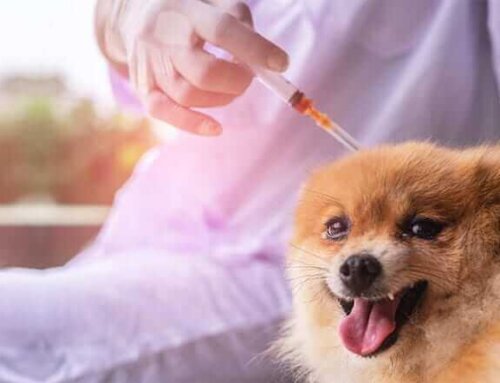I often get questions about diabetic pets who wax and wane with their diabetic regulation. Owners tell me that the appetite is sometimes good and sometimes poor. Managing diabetes can be very frustrating when the appetite is so variable. Considering that these pets are diabetic, pancreatitis comes to mind as a possible cause for intermittent anorexia or poor appetite. Pancreatitis causes nausea. Nausea doesn’t always present with vomiting. Sometimes nausea presents as poor appetite.
Remember that the pancreas is the organ that makes insulin and digestive enzymes. Some pets become diabetic after an episode of pancreatitis due to scarring and fibrosis of the pancreas. Some pets have recurrent episodes of pancreatitis. Pancreatic digestive enzymes help digest the foods we eat. If the pancreas gets acutely inflamed, these enzymes can cause total havoc on surrounding tissues if they leak outside of the pancreas and small intestine. During acute pancreatitis a pet typically acts very ill. With chronic pancreatitis it’s not always so obvious when a pet is having a flare up. Today I figured I’d talk about testing for pancreatitis as it can be a tricky diagnosis.
Classic Physical Exam
Physical exam is the starting point with any disease. Dogs and humans with acute pancreatitis usually have horrible belly pain. Cats with pancreatitis may or may not exhibit pain when a veterinarian palates the abdomen. It would make sense that it should hurt like heck. Imagine oozing of digestive enzymes that normally digest our food into the abdominal cavity. Ouch! Nonetheless, cats don’t exhibit pain as we would expect like humans or dogs. Cats may simply become quiet rather than act painful. Cats are tough cookies.
Ultrasound and X-rays
Ultrasound and X-rays are the most common imaging tests for pancreatitis in a general practice. Often we are taking X-rays to make sure Fluffy didn’t eat something naughty that is causing an obstruction! Radiologists like to describe an area of pancreatitis as having a round glass appearance. Hah! I’ve been in this business nearly 30 years and I’m not sure I’ve ever been able to see a round glass appearance with pancreatitis. Twenty years ago, ultrasounds weren’t nearly the quality that they are today. These days a good ultrasonographer might be able to find even a normal tiny pancreas via ultrasound. Back in the old days if a radiologist could find pancreas it meant it was inflamed.
The “Spec” Test
“Spec” tests by Idexx Labs include Spec-FPL (specific feline pancreatic lipase) for cats or Spec-CPL (specific canine pancreatic lipase) for dogs. I love these tests! Idexx is one of the main veterinary reference laboratories in America. They do a lot of the veterinary research and innovation for diagnostic veterinary laboratory testing. This test has made life so much easier for practicing veterinarians like me. Within minutes vets can have an answer (normal versus positive) by using the bedside test. A negative is usually a negative and a positive is often truly pancreatitis. There is a fancier option that gives us a quantitative number for pancreatitis. For that version a blood sample must go to the outside lab and the vets get the answer within 12 to 24 hours. If the bedside test comes up positive your vet may send out the quantitative test. Or, smaller vet clinics may not see enough patients to warrant keeping the bedside tests in stock without them expiring in the fridge, and those clinics may automatically send the test to the outside lab rather than starting with the bedside test. These spec tests are more accurate for our canine friends than for our feline friends.
The Blood Profile
Amylase and lipase on a chemistry profile used to be how vets became suspicious of pancreatitis on a blood profile. Amylase and lipase can come from anywhere along the GI tract, so they are not nearly as trustworthy as the Spec-FPL or Spec-CPL tests. Other possible abnormalities on a blood profile in a pet with pancreatitis might be increased liver enzymes. Since the pancreas lives in proximity to the liver, the inflamed pancreas might incite inflammation in the liver next door. Often pets with pancreatitis will have a high white blood cell count.
Serum TLI
There are some tests available through diagnostic laboratories call serum TLI (trypsin like immunoreactivity) and PLI (pancreatic-like immunoassay) available, but these tests have a longer turnover time than the spec tests. The cTLI test is the most sensitive diagnostic test for pancreatitis in dogs and the fPLI test is the most sensitive diagnostic test for cats. Unfortunately, these tests take days to get a result whereas the “spec” tests are immediate bedside results or overnight turnaround time if sent to the lab. Oftentimes pets are better by the time the PLI and TLI test results would be back!
Exploratory Surgery and Accidental Pancreatitis Diagnosis
Pancreatitis is usually a medical disease, treated with fluid therapy to keep a pet hydrated. Vets also use pain meds and anti-nausea meds to keep pets comfortable. Unfortunately, sometimes veterinarians make the diagnosis upon surgical exploration of the abdomen. For example, if a knucklehead Labrador, perhaps a dog known for eating socks, presents with a very painful abdomen, the veterinarian would be apt to do an exploratory surgery. The veterinarian might run the bowel and find no foreign sock material and then notice that the pancreas (normally a soft spongy pink organ tucked between the duodenum and stomach) might be angry and swollen and red. That’s when veterinarians nearly pass out and say a prayer and gently put the pancreas back in the abdomen! Visual inspection of the pancreas is probably the most definitive diagnosis, but let’s hope we can figure it out based on less invasive tests than exploratory surgery!
Have a question or comment? Post below or email me at [email protected]. I always enjoy hearing from my readers!
NOTE: Consult your veterinarian first to make sure my recommendations fit your pets special health needs.













My jack Russell 1yr highly active had very high pancreatic enzymes but very low Eos. Was diagnosed as pancreatitis and is on powdered enzymes and Id food and is doing well. Just seems strange with low eos. Guess I’m asking for a second opinion